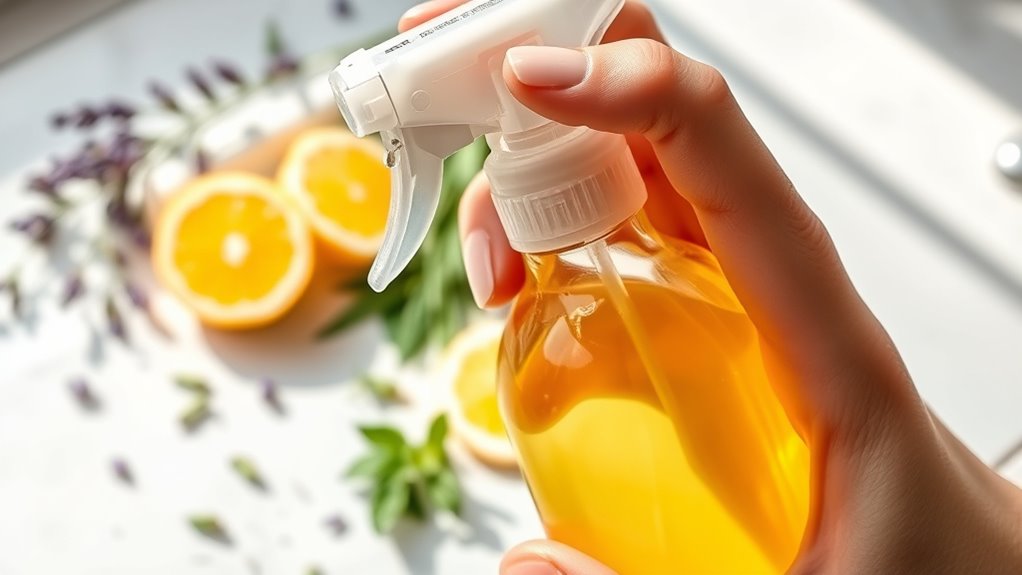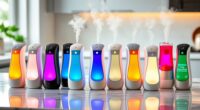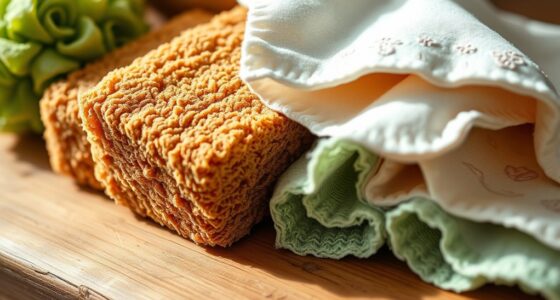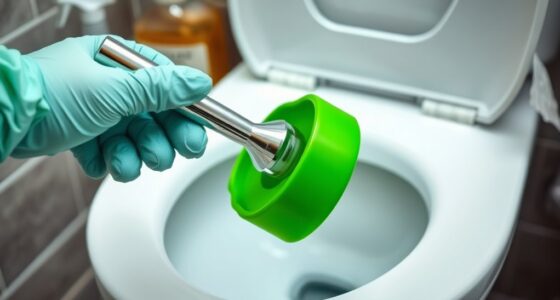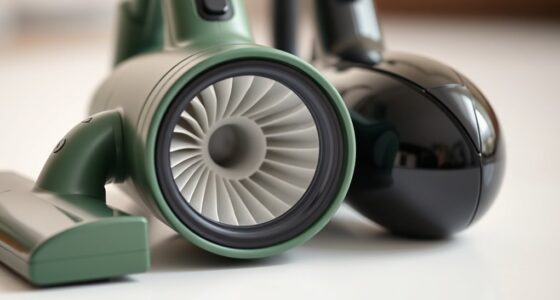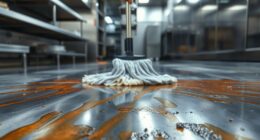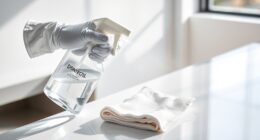Using essential oils in cleaning can be a safe and effective natural alternative to chemical cleaners. They help fight germs, mold, and grime while adding pleasant scents like lemon, eucalyptus, or tea tree. Proper dilution and application are key to ensuring safety and effectiveness. Many DIY solutions work well and are environmentally friendly, too. If you want to learn more about how essential oils can upgrade your cleaning routine, keep exploring the options available.
Key Takeaways
- Essential oils like tea tree and lemon have natural antimicrobial and degreasing properties, making them effective in cleaning.
- When properly diluted, essential oils are safe for household use and reduce exposure to harmful synthetic chemicals.
- DIY essential oil cleaners are environmentally friendly, biodegradable, and help lower household chemical waste.
- Their effectiveness depends on correct formulation and usage; they can combat germs, mold, and grime effectively.
- Using essential oils in cleaning supports sustainable practices and offers a safer, customizable alternative to commercial products.
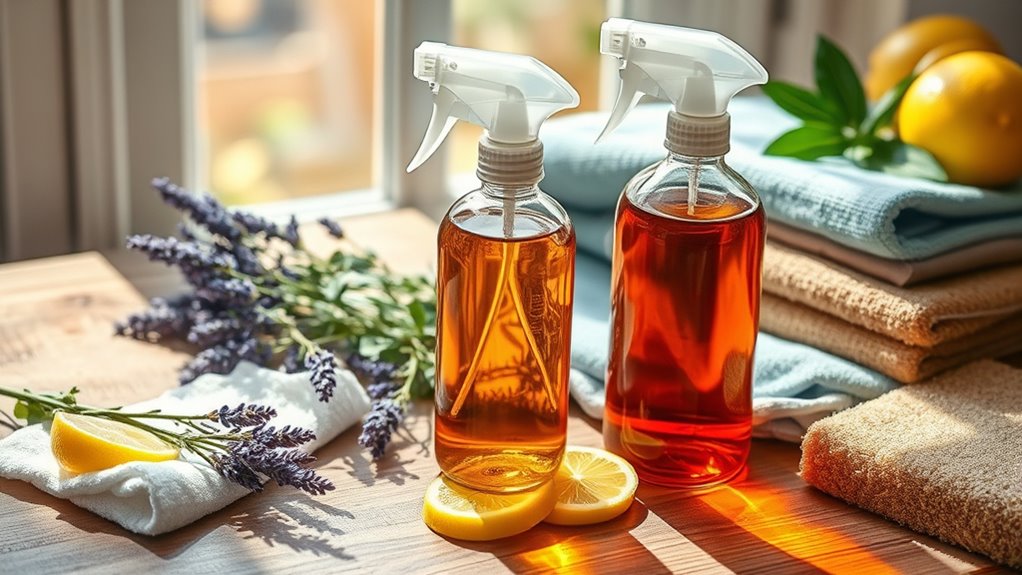
Cleaning with essential oils offers a natural and effective way to freshen your home. Many people are turning away from harsh chemical cleaners, seeking alternatives that are safer for both their families and the environment. One popular approach is creating your own cleaning products using DIY recipes infused with essential oils. These recipes typically combine simple ingredients like vinegar, baking soda, or castile soap with a few drops of essential oils such as tea tree, lemon, or eucalyptus. Not only do these homemade cleaners smell great, but they also allow you to control what goes into your products, avoiding synthetic fragrances and potentially harmful chemicals.
When you opt for DIY recipes with essential oils, you’re making choices that positively impact the environment. Commercial cleaning products often contain chemicals that can pollute waterways, harm wildlife, and contribute to air pollution during manufacturing and use. By contrast, homemade cleaners using essential oils tend to have a smaller environmental footprint. They are usually biodegradable, and you can select ingredients that are sustainable and eco-friendly. For instance, using plant-based ingredients like vinegar and baking soda reduces reliance on petrochemicals, which are derived from non-renewable resources and can be toxic to ecosystems.
Additionally, creating your own cleaning solutions helps cut down on packaging waste. Many store-bought cleaners come in single-use plastic bottles, which often end up in landfills or oceans. When you make your own cleaners, you can reuse spray bottles and containers, further reducing waste. This practice aligns with eco-conscious habits and contributes to lowering your household’s overall environmental impact. Plus, DIY recipes tend to be more cost-effective over time, allowing you to save money while also supporting sustainability.
You might worry about the effectiveness of these homemade solutions, but many DIY recipes with essential oils are quite powerful against germs, mold, and grime. For example, tea tree oil has natural antimicrobial properties, making it a great addition for disinfecting surfaces. Lemon oil can cut through grease and leave a fresh scent. When used correctly, these oils enhance the cleaning power of your homemade products without the need for synthetic chemicals. In fact, some Vetted products like the Flat Iron Bike conversion kits have been tested for reliability and safety, similar to how DIY cleaning solutions can be assessed for their effectiveness and safety when used properly. Of course, it’s important to research proper dilution ratios and usage tips to ensure safety and effectiveness.
Frequently Asked Questions
Can Essential Oils Replace All Traditional Cleaning Products?
You might wonder if essential oils can replace all traditional cleaning products. While DIY solutions with essential oils can effectively disinfect and freshen your home, they may not always be as powerful against heavy grime or pathogens. Using them can reduce chemical exposure and lessen environmental impact. However, for certain tough cleaning jobs, traditional products could still be necessary. Balance your choices based on the task and prioritize eco-friendly options when possible.
Are Essential Oils Safe for Children and Pets During Cleaning?
You should be cautious about using essential oils around children and pets, as their safety isn’t guaranteed. Essential oils can cause allergic reactions or toxic effects if ingested or inhaled in large amounts, so always consider pets’ safety and children precautions. Keep oils out of reach, dilute them properly, and avoid using strong oils in areas where your kids and pets spend time. When in doubt, consult a healthcare professional.
How Long Do the Cleaning Effects of Essential Oils Last?
The duration effectiveness and scent longevity of essential oils during cleaning vary depending on factors like the oil type and room conditions. Typically, you can expect the fresh scent to last from a few hours up to a day. To extend the aroma, consider reapplying or using diffusers. Keep in mind that some oils may fade faster, so choosing more potent options can help maintain the desired scent longer.
What Are the Best Essential Oils for Antibacterial Cleaning?
Did you know that tea tree oil has been proven to have natural antimicrobial properties comparable to some synthetic disinfectants? For scented cleaning, tea tree, lemon, and eucalyptus oils are your best options for antibacterial cleaning. They’re effective, natural antimicrobials that help disinfect surfaces while leaving a fresh scent. Using these oils in your cleaning routine can boost hygiene without harsh chemicals, making your space safer and more inviting.
Can Essential Oils Cause Allergic Reactions During Cleaning?
You might experience allergy symptoms or skin reactions when using essential oils during cleaning. Some oils can trigger sensitivities, especially if you have allergies or sensitive skin. It’s best to do a patch test before full use and dilute oils properly. If you notice any irritation or symptoms like sneezing, itching, or redness, discontinue use immediately. Being cautious helps prevent adverse reactions and keeps your cleaning routine safe.
Conclusion
While essential oils can add a lovely aroma to your cleaning routine, don’t expect them to replace tried-and-true disinfectants. They can be a gentle, natural touch—much like a mother’s comforting hug—but remember, they’re not magic. Always use them safely and wisely. In this modern age, it’s wise to blend old-world wisdom with science—think of it as your own secret potion—ensuring your home stays fresh, safe, and truly sparkle like a jewel.

